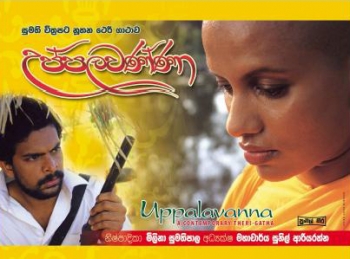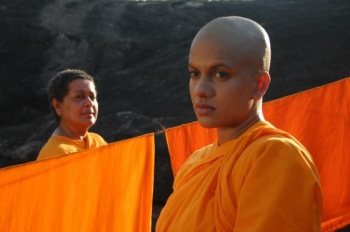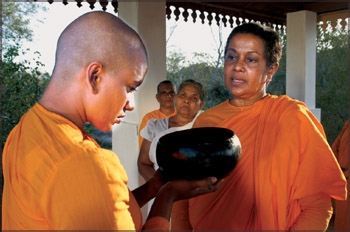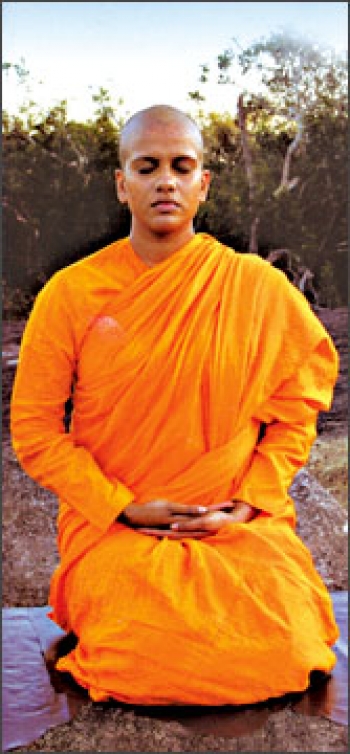Editor's note: this film review contains spoilers.
---
The story takes place in the days of terror in the civil-war-torn Buddhist country of Sri Lanka. Upuli, a woman who is born to an aristocratic physician father and a respectable mother, falls in love with a low-caste dancing teacher. Her parents opposed her love affair, so she leaves her parents and gets married. Due to this shock and sorrow, her mother dies of a heart attack, and her father shoots the lover dead and goes to jail. In spite of this, Upuli did not blame her father. Bearing up her troubles, Upuli then becomes a Buddhist nun, taking the name Uppalavanna, and takes residence in a nunnery in the remote Sri Lankan countryside to lead a tranquil, disciplined and moral life.
---
The story takes place in the days of terror in the civil-war-torn Buddhist country of Sri Lanka. Upuli, a woman who is born to an aristocratic physician father and a respectable mother, falls in love with a low-caste dancing teacher. Her parents opposed her love affair, so she leaves her parents and gets married. Due to this shock and sorrow, her mother dies of a heart attack, and her father shoots the lover dead and goes to jail. In spite of this, Upuli did not blame her father. Bearing up her troubles, Upuli then becomes a Buddhist nun, taking the name Uppalavanna, and takes residence in a nunnery in the remote Sri Lankan countryside to lead a tranquil, disciplined and moral life.
In 1989 in the very forest where the nunnery is located, an insurgent of the country’s civil war assassinates an identified university student who is one of the villagers there. However, in the fight with the student, the insurgent is seriously injured, falls unconscious, and awakens to seek refuge in the premises of the forest nunnery, which is prohibited to males. Uppalavanna comes upon this wounded youth and the conflict in the story begins. As the daughter of a native physician, she is aware of medical therapies and here is confronted with a dying patient. Uppalavanna is faced with moral challenges: should she heal him back to life? Or allow him to die? Or hand him over to police custody? Besides which, it is against the codes of the nunnery that a male is present in the monastery.
The insurgent at first is very frustrated and wants to commit suicide. Uppalavanna stops him from committing suicide and decides to treat him. In the process, she also heals his mind and tells him, “Don’t hate the society, extend the loving-kindness. Nothing can be solved by murder.” The insurgent not only recovers physically, but also slowly softens mentally and calms down.
In the meantime, police officers comb the forest, looking for the assassin who killed the university student. One day Uppalavanna discovers that her patient is no longer hidden because villagers had come and taken him away and killed him. When the villagers learned that he had received medical care inside the nunnery, they refused to offer alms any more to the community of nuns.
In order to resolve the situation and establish the innocence of the other nuns, Uppalavanna decides she must leave the nunnery carrying only her alms-bowl. Before she departs, she asks the Abbess, “Is there anything wrong with my act of caring for the wounded man?” The chief nun answers, “No, nothing”, reaffirming that Uppalavanna had acted correctly. Her departure from the nunnery was only a way of resolution for the sake of the community; not meaning that her act to save the murderer was wrong.
The carefully selected cast is one of the most important features in this amazing movie: from the main character Uppalavanna, the chief nun and the little nun (the little one) all performed brilliantly, contributing to the quality and essence of the message of the teachings in the film.
This insightful drama reminds us that even choosing a spiritual life does not always provide escape from the troubles of the outside world and practical concerns. We should always remember the Buddhist principles of compassion and forgiveness. The dead are unfortunately dead. But, more importantly, what care and concern can be given for those who are still alive?


















